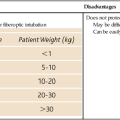Medicolegal principles: Medical negligence
Lack of informed consent
Courts have long recognized that patients have a right to consent to medical treatment. (For more information on informed consent, see Chapter 236.) A patient may allege that no consent was given for a procedure and may seek damages for battery. More often, however, patients allege lack of informed consent or negligent nondisclosure. A physician has a legal obligation to advise the patient of certain risks and benefits associated with medical care, as well as available alternatives. Liability may be based on whether the physician failed to disclose a risk that should have been disclosed and whether that risk occurred.






